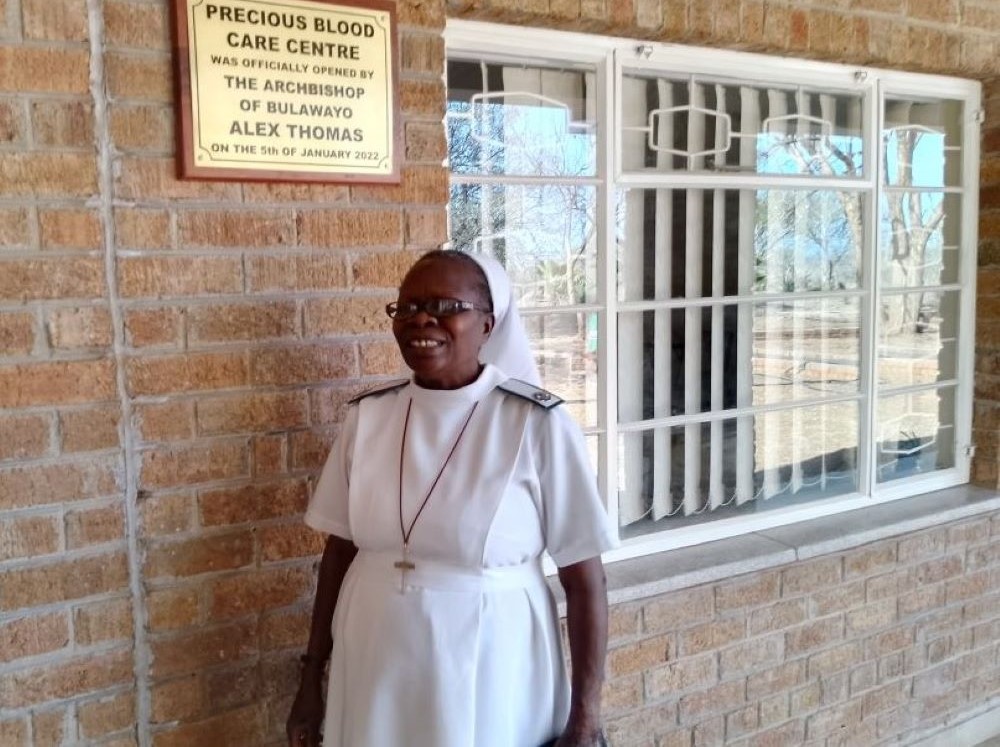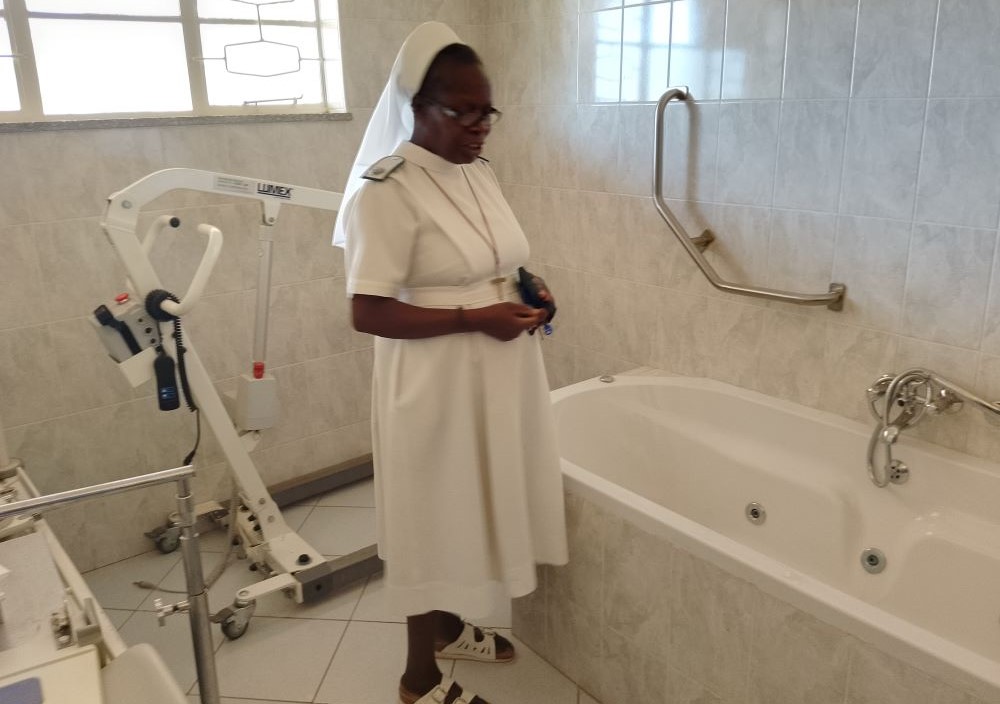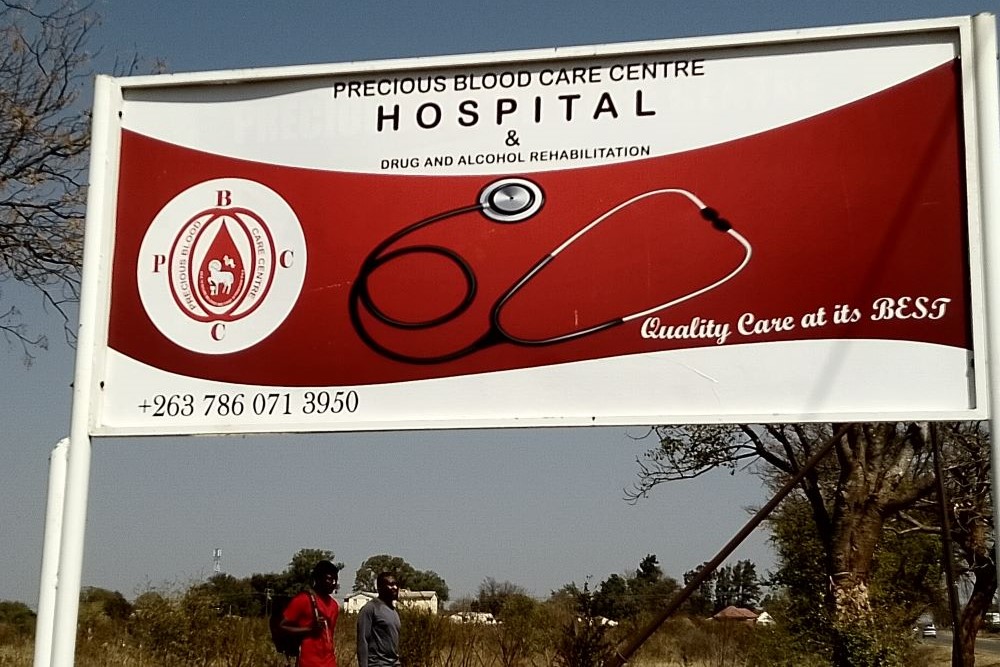
Precious Blood Sr. Caroline Busvumani stands at the entrance of the Precious Blood Care Centre in Bulawayo, Zimbabwe. The center opened in 2022 amid a spike in drug and substance abuse in Zimbabwe. (Marko Phiri)
Amid a spike in drug and substance abuse in Zimbabwe, Catholic sisters in the country's second city have set up a rehabilitation center to address what authorities say is an urgent public health crisis.
Drug abuse has emerged as one of the country's hot buttons, and the Missionary Sisters of the Precious Blood, popularly known as CPS nuns from their Latin name Congregatio Pretiosi Sanguinis, have responded by establishing one of a handful of such facilities in the city of Bulawayo.
Precious Blood sisters have a presence in various apostolates in Zimbabwe including social work, health and education, where they run several mission schools.
The setting up of the drug and rehab center comes at a critical time when authorities have raised concerns about widespread substance abuse, which critics say is being driven by economic hardships.
Hordes of unemployed youths have taken to drugs to deal with their dire economic circumstances as the government struggles to create job opportunities for millions.
Public health advocates have noted that government hospitals do not offer specialized care, such as counseling for people with drug addictions although alcohol and substance abusers are a permanent presence on the country's streets.

Precious Blood Sr. Caroline Busvumani shows the inside of the hydrotherapy room at the Precious Blood Care Centre located in Bulawayo, Zimbabwe. In addition to drug and substance abuse rehab, the center also offers medical assistance such as physiotherapy, reflexology and hydrotherapy, where water is used in palliative care. (Marko Phiri)
The Precious Blood Care Centre was officially opened by Bulawayo Archbishop Alex Thomas in 2022, and is located within an infirmary that also serves as a hospice and home for the aged.
The sisters say the project is part of efforts to be self-supporting as more and more religious congregations feel the strain of dwindling financial resources.
"We set up the drug and rehabilitation center at the infirmary because we realized drug abuse as an urgent social problem that needs to be addressed," said Sr. Caroline Busvumani, a qualified nurse in charge of the Precious Blood Care Centre.
In April, the government proposed setting up the Zimbabwe Drug and Substance Abuse Agency, two years after the Precious Blood sisters opened their rehab center, highlighting the country's long-running challenges to address what has become a public health crisis.
Health activists have recently suggested that drug and substance abuse be declared a national emergency amid an escalation of cases and death and crime reports due to drugs.
Official government data show the extent of the problem the Precious Blood sisters are seeking to address.
More than 6,000 people were arrested during the first quarter of 2024 on drug charges, according to the Zimbabwe Republic Police.
Drug and substance abuse in Zimbabwe has attracted government attention, with Information Minister Jenfan Muswere telling state media that the prevalence of the problem had become "a global issue and Zimbabwe is not spared."
"Drug and substance abuse has become a threat to economic development, social harmony, health and wellbeing, public order and security," Muswere is quoted saying.
The minister's comments come as local courts say they are seeing a spike in crimes committed under the influence of drugs. The government responded by setting up an Inter-Ministerial Taskforce on Drug and Substance Abuse in June.
As part of that drive, the government also announced the establishment of drug rehabilitation centers across the country, efforts the Precious Blood sisters are already supporting.
"When we first built the center, we had planned to house our retired sisters but realized we could actually use it as a fund-raising initiative and that's how we came to establish the health care center," Busvumani said.
The sisters work with medical professionals, physicians who attend to patients brought in by their families, and the center admits drug and substance abuse patients to detox.
"We call the doctors from outside to come and assist, while some drug abuse patients are brought in by doctors to use our facilities. With drug abuse patients, they need to go for counseling and we work with trained professionals to provide that service," Busvumani told GSR.
The center also employs nurse aides who assist with various duties to ensure the infirmary runs smoothly.
In addition to drug and substance abuse rehab, the center also offers medical assistance such as physiotherapy, reflexology and hydrotherapy, where water is used in palliative care, Busvumani explained.
Like many other health institutions in the country, the Precious Blood Care Centre faces its fair share of challenges.
"Patients do not have the money for health care. We have the facilities to house 21 patients, but the numbers are always fluctuating because of the economic situation," Busvumani said.
Besides low patient occupancy, the sisters say other challenges include the costs of maintaining the care center.

The Precious Blood Care Centre was officially opened by Archbishop Alex Thomas of Bulawayo, Zimbabwe, in 2022. It is located within an infirmary that also serves as a hospice and home for the aged in the country's second largest city. (Marko Phiri)
Although it's a relatively new building, Busvumani said storms have damaged parts of the infirmary's roof, and the sisters have struggled to get it repaired.
Other challenges include difficulties in getting remittances from medical insurance companies after patients have been discharged.
"Some medical aid schemes have made it difficult for us to recover our fees as we admit patients under the mutual understanding that they are covered by medical insurance," Busvumani said.
However, the efficacy of medical insurance in Zimbabwe has been tested by the harsh economic situation amid high costs of health care. Many private health care providers are declining to accept patients covered by medical aid demanding cash instead.
Even underfunded government hospitals have been cautious in accepting patients on medical insurance because of delays in payments, and public hospitals have not prioritized drug abuse cases as health emergencies.
Advertisement
For the Precious Blood Care Centre, desperate times have called for desperate measures as they try to provide a much-needed public health service.
"It has meant that we do not accept patients from some known medical aid schemes. It would be better for us to accept cash, but with the prevailing economic situation in the country, this has proven to be difficult," the Precious Blood nun said.
The congregation's long-term plans for the rehab center include expanding the infirmary by adding an administration block and a clinic. These changes depend on the availability of resources, Busvumani said.
"There is always an urgency to provide quality health care, but we can only do so much during these hard times," she said.






